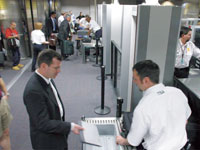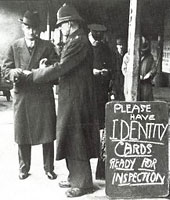The Legal Case
John Gilmore's case before the Supreme Court is about one thing: Secret Law.
In many ways, this is unfortunate. John's core issue has been the right of every American to travel freely in their own country. That issue has been obscured by the secret law issue. TSA lawyers claim in court that people CAN travel without an ID, by being searched more intensely. But when people actually try to do that, TSA employees in airports refuse. There's no published law to point them at, no way to say, "THIS is the real rule, not that sign you printed up and posted. Let me travel, you lawless thugs!".
Without the ability to see and understand the law, people in the real world can't enforce the rights that the law gives them. And it becomes much harder to challenge the details of that law in court, for example to see whether it's constitutional to make ID-less travelers undergo an extensive, warrantless, suspicionless search.

We think the secrecy of this law violates "Due Process of Law". Without our 5th Amendment right to Due Process, the rest of our Constitutional rights become unenforceable. It is vital that the Supreme Court set the law to rights and allow citizens to see the laws being applied to them.
Once we can read the now-secret law governing showing ID at airports, it then becomes possible to challenge that law. What Gilmore and others really want to know is:
- Do citizens currently need to show ID in order to travel in their own country?
- If the answer is 'yes', is this constitutional?
We know that nowadays, travelers are constantly being required to show their ID. John Gilmore wasn't able to fly on Independence Day 2002 because he would not produce identification. ID is now required to board planes, trains, buses, and even cruise ships. These ID demands prevent travel by Americans who will not show their "papers". Is such a requirement constitutional?
Many Americans incorrectly assume that our right to travel anonymously has been legally suspended by the USA Patriot Act. This is not true: the USA Patriot Act contains no such provision.
The Right to Travel involves a number of constitutional issues:
The 1st Amendment
Physical travel and the First Amendment are inextricably intertwined. If you can't travel, then how can you exercise your right to Assemble? You can't Associate either, because you won't be able to get anywhere. Your right to Free Speech is also affected. You can say what you want, just not at that conference you wanted to attend but couldn't because you weren't allowed to get on a plane.
The 4th Amendment
Refusing a government "request" for ID triggers a severe penalty, such as loss of free movement. And lest we forget, having to show your ID is a search without a warrant.

Thankfully, the United States of America has no national ID card. We have no 'papers' to show. How can we as citizens be forced to produce something on demand that we aren't required to have in the first place?
None of these important Constitutional questions can be addressed until the Supreme Court brings the government back in line with over seven hundred years-worth of legal precedent by ordering the Department of Homeland Security to let us read the laws that affect our lives and liberties.
Secret Law was an abomination that supposedly ended back in the 12th century... or so we thought. How did we get from there to here and back? Read on...